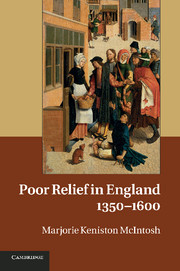Book contents
- Frontmatter
- Contents
- Acknowledgements
- Notes on conventions and online resources
- Abbreviations
- 1 Introduction
- Part I Late medieval and early Tudor patterns
- Part II Profound change during the early Reformation period
- Part III Intensified problems and altered approaches in the later sixteenth century
- Part IV Responding to the problems
- Appendices included in the printed volume
1 - Introduction
Published online by Cambridge University Press: 05 January 2012
- Frontmatter
- Contents
- Acknowledgements
- Notes on conventions and online resources
- Abbreviations
- 1 Introduction
- Part I Late medieval and early Tudor patterns
- Part II Profound change during the early Reformation period
- Part III Intensified problems and altered approaches in the later sixteenth century
- Part IV Responding to the problems
- Appendices included in the printed volume
Summary
Between 1350 and 1600, poor relief in England moved from a complex array of diverse kinds of assistance towards a more coherent and comprehensive network of support. The first century after the massive outbreak of bubonic plague in 1348–9 was marked by low population and relatively mild problems with poverty, but unstable economic and demographic conditions in the later fifteenth and early sixteenth centuries rendered more people vulnerable to short-term hardship. Throughout those years most aid was awarded only occasionally, typically to individuals struck by some particular misfortune. Between around 1530 and 1553, poverty intensified and the forms of relief changed significantly. Whereas attitudes towards the poor and almsgiving had been shaped by Catholic beliefs during the later medieval years, the new patterns were influenced by humanist or “commonwealth” ideas about the responsibilities of a Christian state and by early Protestant theology. The most important development, initiated by the central government, was the introduction of parish-based aid, financed by regular payments made by wealthier members of the community. During the second half of the sixteenth century, as need continued to mount, local communities and generous individuals experimented with how best to provide assistance. The elderly and chronically poor now qualified for help, sometimes receiving ongoing support. The bad harvests of the later 1580s and 1590s increased the suffering and heightened public concern about poverty, leading to the massive Poor Laws of 1598 and 1601.
This book examines three main forms of poor relief across those centuries: licensed begging by individuals and gathering for charitable institutions; the free housing and sometimes other benefits offered by hospitals and almshouses; and aid given through or by parishes. Other kinds of aid receive only peripheral attention here, including the essential help provided by friends, relatives, and neighbors. Although many people drew upon informal support, it is seldom documented in writing prior to the seventeenth century and hence cannot be examined in any detail. The three kinds of semi-institutionalized aid, by contrast, found their way into the records, enabling us to trace their history over time.
- Type
- Chapter
- Information
- Poor Relief in England, 1350–1600 , pp. 1 - 36Publisher: Cambridge University PressPrint publication year: 2011



